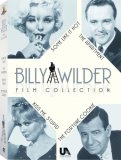| Reviews & Columns |
|
Reviews DVD TV on DVD Blu-ray 4K UHD International DVDs In Theaters Reviews by Studio Video Games Features Collector Series DVDs Easter Egg Database Interviews DVD Talk Radio Feature Articles Columns Anime Talk DVD Savant Horror DVDs The M.O.D. Squad Art House HD Talk Silent DVD
|
DVD Talk Forum |
|
|
| Resources |
|
DVD Price Search Customer Service #'s RCE Info Links |
|
Columns
|
|
|
Billy Wilder Film Collection (Some Like It Hot Special Ed., The Apartment Collector's Ed., Kiss Me, Stupid, The Fortune Cookie)
MGM and 20th Century Fox have released the Billy Wilder Film Collection, a budget-conscious, four-film compilation of previously released DVD transfers. Titles included are Some Like It Hot (Special Edition), The Apartment (Collector's Edition), Kiss Me, Stupid, and The Fortune Cookie. There's nothing new here for buyers who already have these titles, so double-dipping isn't a concern. But those new to Wilder's sardonic, cynical - and of course, frequently hilarious - takes on the human condition might find the Billy Wilder Film Collection worth a look.
SOME LIKE IT HOT
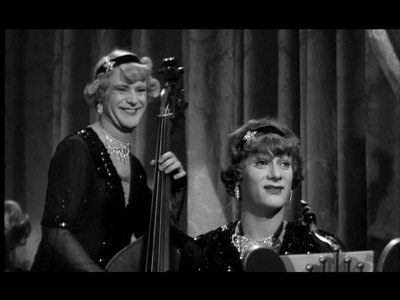
Chicago, 1929. At the height of Prohibition and the gangster wars, musicians Joe (Tony Curtis) and Jerry (Jack Lemmon) find themselves on the lam when they accidentally witness a mob rub-out, a la "The Saint Valentine's Day Massacre." Looking for any opportunity to high-tail it out of Chicago, Joe comes up with the idea of hiding out with an all-girl jazz band that's traveling down by train to sunny Florida for a two week gig at Miami's Seminole-Ritz Hotel. Decked out in full drag, the two red-blooded musicians (now known as Josephine and Daphne) immediately realize how hard it's going to be to stay in character when they meet Sugar Kane Kowalczyk (Marilyn Monroe), the insanely sexy lead singer of the band who immediately takes to the two new "girls."
Unlucky in love, and confessing a weakness for tenor sax players (which of course, Joe is), Sugar proves too tempting a target for Lothario Joe, who immediately plots a way to pass himself off as Sugar's dream come true: a sensitive, helpless, glasses-wearing millionaire. With the unknowing aid of real-life, aging millionaire playboy Osgood Fielding III (Joe E. Brown), who becomes enamored with the broad-shouldered, flat-chested, smart-mouthed Daphne, Joe succeeds in winning Sugar, but trouble multiplies when the boys discover that Spats Colombo (George Raft), the murderous gangster that has been hunting them down, has checked into the Ritz.Having seen Some Like It Hot countless times as a kid and an adult (it was a big hit on '60s and '70s television, especially on late-afternoon "Big Shows"), it's more difficult now to remember experiencing the film for the first time, marveling at Wilder's assured, driving rhythm of jazzy jokes and soft, erotic, funny love scenes, while laughing at the perfectly matched pairing of Curtis and Lemmon, who both perhaps hit career heights (Curtis certainly never had a better comedy in his later career, and Lemmon here is free of his later assorted muggings and actorly ticks). It's almost as if, seeing Some Like It Hot so many times, one can't help but look for cracks now when analyzing it - and that's a pity. Because anything said critically about it now ignores the fact of how perfectly it plays for the new and uninitiated.
That being said, watching Some Like It Hot for the umpteenth time, it does seem just a tad protracted going into the third act (a not uncommon occurrence in Wilder's films, including the three other titles here in this DVD collection), when the mechanics of the plot need to be lined up again in order for the various denouements to mesh. 122 minutes is a long running time for a comedy, and it's a testament to Wilder's skill that he makes Some Like It Hot seem much speedier than the clock would indicate. But that's a minor consideration to the overall film, and in much the same way that multiple viewings may blunt the initial excitement of the piece for viewers, they have also allowed a concentration on some of the peripheral performances or small, previously unnoticed little bits of business that might not get our full attention on the first go-around. Joe E. Brown's Osgood looks better and better everytime I see it. You can tell he's clearly delighted to be in a high-profile project late in his celebrated career (when is somebody going to release his delightful early comedies on DVD???). He's almost spookily in-tune with Wilder's conception of an aging, Jazz Age playboy, giving the film a needed jolt of energy whenever he's on camera (watch the various inserts of Osgood blowing kisses to Daphne when she's/he's on the dance stand, and try and figure out who's more grotesquely hilarious: Lemmon and Curtis' ghastly come-ons, or Osgood's satchel-mouthed, simian flourishes).
Never particularly a George Raft fan (I leaned more towards Bogey and Cagney), his iconic presence here is an appropriately violent anchor that lends a necessary gravity for the comedy framework. If we don't believe that Joe and Jerry are really in danger for their lives, the film would fall apart, and Raft's memorably sinister, hard-nosed appearance at the garage massacre ("You won't breathe nothin'. Not even air.") carries right through the two hour running time until his reappearance in the third act. And, at the risk of incurring the wrath of 99.9% of all known moviegoers, I was never all that big on Marilyn Monroe, either, but watching her here again, she is, as Wilder famously stated, "worth it" despite the innumerable difficulties she brought to the production. There is something beautifully erotic and soft and vulnerable about her Sugar Kane, but she's also delightfully funny in her romantic scenes with Curtis, generating a palpable heat when she's crushing her nearly naked body against his while vainly, hilariously, trying to excite the "impotent" Joe. It's such a unique, one-of-a-kind performance (her lovely singing never gets mentioned enough, here, either), I can't imagine any other actress coming close to achieving the effects Monroe effortlessly manages.
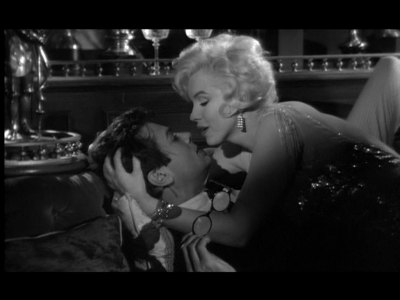
The DVD:
The Video:
Unfortunately, the old, "Special Edition" transfer for Some Like It Hot is utilized here, presenting a flat, 1:66 letterboxed picture rather than the newly improved anamorphic 1.85 widescreen that was struck for the more recent "Collector's Edition." That may be a deal breaker for potential buyers.
The Audio:
There's a nice Dolby Digital 5.1 Surround re-mix that nicely accentuates some funny audio gags (like Joe and Jerry's initial constipated playing when jamming with Sweet Sue), along with the original English mono mix for purists. French and Spanish mono mixes are also available, along with French and Spanish subtitles. English close-captions are available.
The Extras:
As with the transfer, the extras for Some Like It Hot: Special Edition are the same, as well. Nostalgic Look Back runs 31:12, and features a 2001 discussion of the film with Leonard Maltin and Tony Curtis. Memories from the Sweet Sues, running 12:04, has four supporting players from the "Society Synchopaters" looking back on the production. Virtual Hall of Memories, running 21:03, is a nicely arranged highlights gallery, which includes production stills and film clips. There are also scans of the original pressbook, along with the original theatrical trailer and other Billy Wilder trailers.
THE APARTMENT
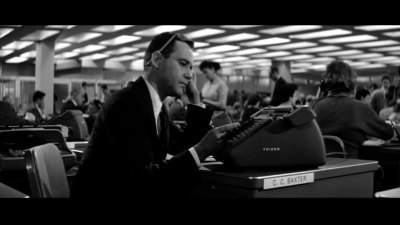
Held in impossibly high regard today, it's important to remember that Billy Wilder's most "respected" comedy (or drama - he can't seem to make up his mind), The Apartment, was not universally loved by the critics when it came out in 1960. Charges of crassness, vulgarity, and tastelessness were thrown around (not uncommon jabs at Wilder even during his critical heyday), but those seem irrelevant today. What's always bothered me about The Apartment is, despite its fervent supporters who laud its sardonic "humanity," is its relatively calculated coldness, which meshes unconvincingly against its moments of calculated sentimentality. I never really believe the carefully considered mechanics of The Apartment, with the wounded characters never properly fleshed out enough in their motivations to make me care about them - or even understand their actions. When the most realistic character in a modern, urban romantic comedy/drama is a cold, unfeeling, blank slate of a snake (Fred MacMurray's J. D. Sheldrake) - and who is basically presented as a creepily weird cipher important only as a plot-mover - then there's big trouble with The Apartment.
C.C. "Bud" Baxter (Jack Lemmon), a "schnook" of a minor cog in a giant New York City insurance company, has somehow allowed himself to let out his apartment on a regular basis to married work superiors who need a place to bring their secretaries and girlfriends. Hoping to get promoted for his efforts, Baxter's amenableness comes to the attention of Jeff Sheldrake (Fred MacMurray), a big wig in Personnel who dangles a big carrot in front of Baxter in exchange for exclusiveness in using his apartment. Baxter readily agrees, and looks forward to finally making his move on Fran Kubelik (Shirley MacLaine), the pretty, sweet elevator girl who Baxter has admired for some time. But unfortunately, he soon finds out that Fran is Sheldrake's off-again, on-again mistress. A suicide attempt brings Baxter and Fran closer together, but will that desperate act be enough for them?
SPOILERS ALERT!
Critics since 1960 have liked to make a big deal about Wilder connecting soulless big business with Baxter's "prostitution," ignoring the fact that not only was Wilder a European cosmopolitan whose sardonic demeanor had a "I've seen it all, and that's the way the world operates" detachment (despite critics' enthusiastic assertions to the contrary, Wilder hardly generates an outraged condemnation to this flip-side of The Man in the Gray Flannel Suit), but that his lead character, Bud Baxter, is more than willing to go along with the deception. It may suit critics to remember that at the end of The Apartment, Bud finally says, "No, thanks," to Sheldrake, thus solidifying their feel-good contention that humanity here trumps big business, but they forget that numerous times throughout the film, Bud has opportunities to be outraged (particularly during Sheldrake's repulsive treatment of Fran after her suicide attempt) - and shirks them. Why does he? Critics who support the film say it's because he's afraid of losing his job, which may be the case, but it's hardly an endearing quality for a character we're supposed to root for (a character flaw that is passed off as "nuanced complexity" by supporters, when it reality, the only way for the plot to physically work is for Baxter to continually act like a doormat).
In fact, we never really do get a good feeling for who Baxter is, or why he does what he does, anymore than we do for Fran or Sheldrake. Fran in particular is treated like a typical Wilder heroine: a subject of contempt; a subject of comedy; a subject of pity - but never a fully rounded, dimensional female character. If we really want to get past the surface drama and pity and "humanity" of The Apartment, we need to understand Fran's motives for being with Sheldrake in the first place, and why she continually goes back to him. But tellingly, Wilder stays away from those scenes like the plague. Her affair with Sheldrake is passed off as yet another instance of her failed judgment in men, but Wilder doesn't trust himself enough to even write the scene that had Fran throwing the compact at Sheldrake (which will be the significant clue that tips off Baxter) when she finds out he's not going to get a divorce from his wife. If she's mad enough to throw that at him, show us it. And if she was that mad, what made her eventually go back to him? We don't know, because Wilder won't show us, or tell us. It's not surprising that in an interview once, Wilder admitted that deep emotions brought up by discussions of his films, should be kept private.
But Wilder, who admitted on several occasions that he went for mass appeal in his films (not in and of itself a bad goal at all, but certainly a pertinent point of departure when discussing the validity of the small-scale, human "honesty" of his films), has plenty of time to show Fran getting slapped around by the totally unbelievable Dr. Dreyfuss (Jack Kruschen), when she tries to commit suicide - an act that, naturally, offends the studiously non-offensive Baxter, who has to look away (critics love Baxter's timidity, but his craven stubbornness not to offend, even beyond the point of all reason - like not telling the truth to Fran's brother-in-law so Wilder can have him falsely martyred with a punch to the nose - eventually becomes gratingly offensive) . Critics hostile to the film at the time cited this scene as typical of Wilder's crude tastelessness, but today, it plays more as a direct example of Wilder's disingenuousness. Ostensibly an honest, raw moment, it comes off as more calculated than revelatory, giving Wilder the chance to debase yet another of his cinematic heroines before offering her an unexplained, fairy-tale-like redemption.
Supporters of The Apartment like to point to Wilder's supposed anti-judgmental attitude towards his characters, seeing in the film a supposed sensitivity to the characters that's ultimately life-affirming. But surely that hands-off approach to the characters comes from Wilder's deficiencies here - from desiring to look not too closely at serious moral implications of his characters' actions, as well as his calculations to make a hit-friendly mass entertainment at the sacrifice of true complexity - rather than any meaningful, deep understanding of the characters' motives (which are never clearly defined to begin with). And when the film does judge, it's hardly a "liberal" stance, as I've read in so many pieces. Fran herself on numerous occasions admits that what she's doing is morally wrong (not surprisingly, Wilder never considers Sheldrake's problematic wife as a potential character), and she's "punished' for it by Wilder with her suicide attempt and her various humiliations at the hands of Sheldrake. Anyone doubting the essentially conservative, judgmental, "safe" tone of the film only needs to see the finale again: she runs from her lover, the lover she admits having an illogical passion for after countless emotional betrayals, when it finally sinks in that Baxter was morally outraged that Sheldrake wanted to take her to his apartment again. She sees the goodness in Baxter, and the "badness," if you will, in her own behavior. Not exactly groundbreaking. Had Wilder had the nerve to end The Apartment in the only honest way possible, considering how the characters were constructed - have them not get together - the film might have survived with a shred of credibility. But Wilder, as he stated on many occasions, wanted hit films (which ruined the last two films in this collection, as well), so Bud and Fran end up playing cards together, with the romantics in the audience thoroughly pleased to see that emotional order has been restored. It's a phony, undeserved ending that's just as undercutting of all that came before it, as the supposedly "moral, liberal" character of Dr. Dreyfuss and his stereotypical Jewish wife Mildred (Naomi Stevens), who are always on hand to give the audience a wink and a nod joke about their perceptions of Baxter as a whoring party-hound. Wilder wants us to know we're supposed to hate what happens to girls like Fran, but ain't those jokes about what Baxter might be up to in his apartment funny? Wilder would increasingly utilize this kind of audience-pleasing undercutting (while forgetting the laser-like acridity and irony of his masterpiece Sunset Boulevard), resulting in more and more compromised films.
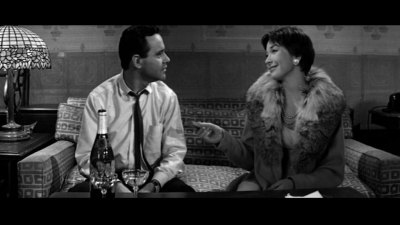
The DVD:
The Video:
Fans of The Apartment will no doubt cheer the new anamorphically enhanced, 2.35:1 widescreen transfer here, with a beautifully rendered gray scale, and a sharpish picture. No compression issues were detected.
The Audio:
There's a new Dolby Digital English 5.1 Surround mix (which accounts for little considering the original sound design), as well as the original English mono track. French and Spanish mono tracks are also available, as well as English and Spanish subtitles. Close-captions are also available.
The Extras:
There's a humorously dense audio commentary by Bruce Block that comes up with the kind of reaching critical leaps of interpretation that used to crack up Wilder when brought up by film students and interviewers. Inside the Apartment, running 29:31, looks at the production of the film and its lasting cultural impact. And Magic Time: The Art of Jack Lemmon, running 12:47, looks at the late, great comedian. There's no original trailer here, but it is included on the Some Like It Hot disc in this collection.
KISS ME, STUPID
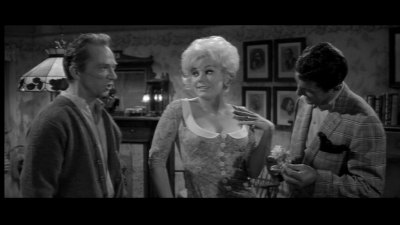
Notorious before it even finished filming (due to star Peter Seller's spectacular brush with death and subsequent removal from the picture), Wilder's smutty, dirty joke Kiss Me, Stupid seems to be forever measured against the film it could or should have been. Coming off the biggest box office success of his career (the equally sex-obsessed, but tamer Irma La Douce), it only seemed natural in 1964 for Wilder to continue in this vein, particularly since Hollywood was in the throes of its own love affair with the naughtily-titled, but deceptively clean, "sex comedy" genre. Unfortunately for Wilder, his star suffered an almost fatal heart attack and had to be replaced by a lesser talent. Couple that with not one but two miscast female leads, as well as Wilder's auteur right to again deliver a two hour-plus comedy, and Kiss Me, Stupid comes up a distinct disappointment.
Diverted to hick desert town, Climax, Nevada, top Hollywood and Vega star Dino (Dean Martin) finds himself at the mercy of Barney's (Cliff Osmond) Service Station, when Barney, an aspiring lyricist, sabotages Dino's car to keep the star in town long enough to sell him on one of his songs. Cooking up a scheme with pathologically jealous, married piano teacher/songwriter Orville J. Spooner (Ray Walston), Barney suggests Orville put up Dino for the night at his home - and use his wife as bait for the peripatetically horny singing star. Walston's wife Zelda (Felicia Farr), the prettiest woman in Climax, has put up with Orville's paranoid delusions of infidelity for five years, and when Orville finds out that she once had a juvenile crush on the star, he quickly hustles her out of the house (after she accidentally sexually encourages Dino - whom she mistakes for Orville in the shower) and goes with Barney's plan to hire waitress/hooker Polly the Pistol (Kim Novak) for the evening to masquerade as his wife. Orville will "give" Dino his "wife," and Dino will buy one of their songs.
But of course complications arise almost immediately, when Polly shows unexpected disdain for Dino when he breaks the rules of propriety - even though she's only playing "house" with Orville. And later, Zelda has trouble of her own when, after a bought of drinking at the local roadhouse The Belly Button, she's mistaken for Polly by Dino, and offered the chance to act like a real whore for the evening.
SPOILERS ALERT!
It's not difficult to find some pleasures in Kiss Me, Stupid if you're not aware of any of the backstory connected with the film's production. Never hilarious, nor nearly as dirty as rumored (only about three or four jokes can really be put down as truly vulgar), Kiss Me, Stupid is obviously on another planet compared to the yearly Doris Day romps that were hitting the suburban drive-ins in the mid-60s. Viewers today are shocked that Wilder "got away" with what he did, but they forget that the jokes and situations here aren't all that different than those naughty, double entendre-laced Carry On films that played to packed art houses all across the country; 1964 viewers weren't scandalized by Kiss Me, Stupid (after all, there were no protests - nor a corresponding booming box office, the true indicator of a scandal). More than likely, Kiss Me, Stupid was viewed as a vulgar little curiosity featuring the wrong stars in a compromised film that delivered a sour little porno reel scenario with too few genuine laughs. Contemporary audiences embrace the film now, but I suspect a lot of that affection is snob appeal; modern viewers love to "rediscover" films that they think those squares back in the 50s and 60s "didn't get."
If you take away the modern misconception that Kiss Me, Stupid presented some view of sexual relations that 1964 American moviegoers couldn't get anywhere else, then you're left with a film that has to stand on its own jokes and setups, and for the most part, the results are middling at best. Simply put: Ray Walston is no Peter Sellers. Had the brilliant Sellers continued in the role, who knows what he would have done with it? There's no guarantee Kiss Me, Stupid would have succeeded had he stayed (reportedly, Wilder and Sellers didn't get along), but there's no getting around the fact that Walston just doesn't bring enough to the role to make the part fly. Particularly when you match him against the effortless mastery of slimy smut that is Dean Martin. This may be Martin's greatest performance. Not because of anything like subtlety, but because Martin seems almost feral in the release of his id here. Martin always prided himself (at least in this later period of his acting career) on leaving deep, personal involvement in his performances far away from the actual sound stages. "Putting on a show" was more than enough for the criminally casual Martin, yet here, he finds a supernatural animation under Wilder's crude jokes and leering camera, becoming almost the living embodiment of one of those animated Tex Avery lecherous wolves. It's a remarkably funny and balls-out turn by Martin, but when it's matched up against Walston, the diminutive My Favorite Martian star disappears on the screen.
But Walston isn't the only weak leg on this chair. Wilder gets no help from either Novak or Farr, either. Farr, whom I can only surmise is in the film as a favor to Jack Lemmon (she had recently married the Wilder veteran), is bright penny dull as Zelda, delivering her lines with a flat, chipper sameness that conveys almost no sense of comedic skill. Wilder's final zoom-in on Farr, when she delivers the film's self-titled punch-line to Walston, shows an actress who conveys almost no life behind those shiny eyes and well-scrubbed face. It's not surprising she was never offered a comparably sized role again in a major production. Novak is a far more accomplished actress, but comedy had to be her weakest skill set, and she's hopeless as Polly the Pistol. Decked out with one of those dreadful accents she would attempt from time to time (this time: New Jersey), she further tries to hide behind a nasally cold, and succeeds in ruining any verisimilitude she might have brought to her whore role. Novak had to be handled very carefully in a role to bring out her special qualities, but here, under Wilder's crude vulgarity, she's awash in a sea of gropings and leerings courtesy of Martin, none of which are particularly funny after the first half hour, then the second, then the third, and then finally the fourth.
As with many later Wilder films, running time becomes a liability, and the admittedly thin, dirty joke premise is stretched to the breaking point. Not that the basic premise is treated with even a modicum of believability in the first place. Granted, this is farce, pure and simple, but when Wilder throws in his synthetic moments of heart-tugging sentimentality (moments that his mentor, Ernest Lubitsch, actually believed in and thus brought off with aplomb), such as Polly swooning when Orville pretends to be her husband and sings her a love song), they feel as jarringly out of place as the dubbed voice that substitutes for Walston's warbling. Worse, we're never even sure why Orville goes ahead and sleeps with Polly; it's such an arbitrary act, without motivation (considering how Orville is supposedly so crazy about his real wife) and brought off without much finesse by Wilder, that whatever suspension of disbelief we were willing to go with has by now evaporated. Zelda's sleeping with Dino at least makes sense considering her backstory, but again, we're never sure why she does what she does, because Wilder only gives us the setup, and then lets us fill in the dirty details. True motivations, true feelings, rarely come up.
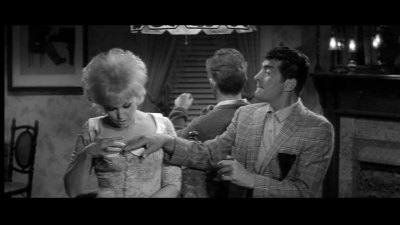
The DVD:
The Video:
The anamorphically enhanced, 2.35:1 widescreen print for Kiss Me, Stupid looks quite sharp and clear, with an acceptable gray scale (I'm never quite sure if Wilder intentionally wanted the film to look a little...dusty) and no compression issues.
The Audio:
Only a Dolby Digital English mono track is available for Kiss Me, Stupid (along with a French mono for those inclined), along with English, French, and Spanish subtitles. English close-captions are also included.
The Extras:
An "Alternate Scene" is included, depicting the Dino's seduction of Zelda in Polly's trailer, which is in reality the original U.S. version of this scene, now supplanted by Wilder's widow when the racier, more explicit international version was discovered after Wilder's death. Usually, I'm against altering films thirty years after they've been released, particularly without the permission of the actual director, but admittedly, this scene does make it clear that Zelda does indeed sleep with Dino, which was open to (small) interpretation in the original U.S. version. The original U.S. theatrical trailer is also included.
THE FORTUNE COOKIE
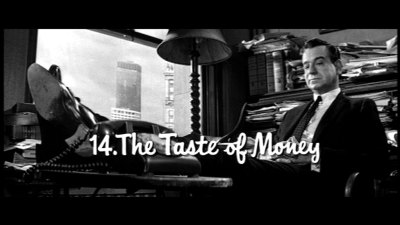
Known primarily today for the first cinematic teaming of Jack Lemmon and Walter Matthau, as well as for Matthau's Oscar-winning turn (as Best Supporting Actor???) as shyster lawyer "Whiplash" Willie Gingrich, The Fortune Cookie is certainly the least interesting offering here in the Billy Wilder Film Collection. Clearly the mark of Wilder in decline, The Fortune Cookie tries to recreate the dynamics of The Apartment with decidedly inferior results, with Matthau's funny performance about the only thing worthwhile here in this compromised comedy.
Harry Hinkle (Jack Lemmon) is a CBS cameraman, stationed in Cleveland, who is injured during a Browns game when Luther "Boom Boom" Jackson (Ron Rich) runs offsides and slams Hinkle over a tarpaulin. Dazed but ultimately unhurt, Harry's shady ambulance chaser brother-in-law Willie "Whiplash" Gingrich (Walter Matthau) immediately sees dollar signs when he learns that Harry suffered a compressed vertebrae as a child. Willie, knowing enough about liability cases to fill a law library, immediately presses Harry to sue the stadium, the football team and CBS, scamming the doctors and insurance companies by claiming he's suffering from partial paralysis. Resistant to the idea, Willie ropes in Harry when he tells him that his ex-wife, Sandy (Judi West) may come back to him if he had money. Harry agrees and looks forward to Sandy's visit, who coincidentally gets into contact with Willie the minute she reads about Harry's injury.
Naturally, lawyers are hired to dispute his claim, and a private investigator, Purkey (Cliff Osmond) is engaged to spy on Harry to see if he's faking. Complicating matters is the guilt-ridden Luther, who slowly falls apart when he sees he's injured a man for life (his father, a boxer, had killed a man in the ring and left the sport). He takes to drinking, but he's sober enough to realize that Sandy, who has returned to Harry, may be by his side for ulterior motives.
SPOILERS ALERT!
It's impossible to find fault with Matthau's performance here. Channeling the spirit of W.C. Fields, and filtering it through a leading man's charisma, Matthau, who had been knocking around Hollywood for quite some time, establishing himself as a desirable second lead (Charade, Mirage) burst forth with his hilarious portrayal here and became a full-fledged Hollywood star. His scary heart attack during production (you can see him magically lose 30lbs from one scene to the next) didn't hurt his chances with the Oscars (Oscar always likes a life-threatening illness), nor did the fact that United Artists pulled a fast one by nominating him in the Best Supporting category, a now-common practice that frees up a strong central performance from competing with other heavyweights in the Best Actor category.
The same can't be said for Jack Lemmon's sour little turn here. Six years after playing the schnook in The Apartment, Lemmon has by this point given himself over to the grating ticks and grimaces and muggings that would rapidly wear out their welcome with late 60s and early 70s audiences (with the wonderful exception of The Odd Couple in '68). "Mugging" seems to be the order of the day with Lemmon's performance here. His face, a mask of vague irritation and unfocused tension, is in constant search of a new twist, doing little to help us like his essentially unlikeable character. Why in the world would Wilder think we would pull for Harry Hinkle, particularly the way Lemmon portrays him? The first time Lemmon starts groaning and moaning unconvincingly on a gurney, we spot a "performance." Worse, a stereotypical "Lemmon performance," and that can be as uncomfortable as they come. It's no surprise that audiences immediately gravitated towards Matthau, whose open, glorious venality provides the only dose of truth and humor here.
Fatally, Wilder also thought we'd care about the entire Luther/Harry subplot, giving the two depressed characters the equivalent of "love" scenes where they express their feelings, their disappoints, and their hopes to each other, without the slightest bit of interest generated as a result. It would be easy to blame novice Rich, but he's fine, given what little he has to do here. No, the problem is with dyspeptic Lemmon, and the patently false Wilder framework. The appearance of Judi West as Sandy shows some promise, with the hope that Wilder will show something of value to this avaricious character. But almost immediately, Wilder returns to form, having Harry calling her a "bitch" (strong stuff for 1966) before, in the final denouement, he literally has her on her hands and knees to allow Lemmon a perfect target to kick her in the ass. It's a low point for Wilder, not for any misogynist reading, but because of the puerility of his vision with this character. Running yet again at over two hours long, the lumpy, leaden The Fortune Cookie comes to a dreary end, with a false, phony "upbeat" ending that also manages to totally absolve Harry of any responsibility he had in ruining Luther's career. With the movie over, we can only remember Matthau's magnificently devious, mournful face, spewing out a litany of litiginous libels - and little else.
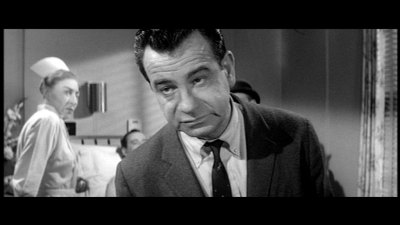
The DVD:
The Video:
Unfortunately, the anamorphically enhanced, 2.35:1 widescreen transfer is taken from a compromised print, with dirt, scratches and heavy grain occasionally marring the image.
The Audio:
The Dolby Digital English mono track accurately reflects the original theatrical presentation, along with a French mono version. French and Spanish subtitles are included, along with English close-captions.
The Extras:
Only an original theatrical trailer for The Fortune Cookie is included.
Final Thoughts on the Boxed Set:
Double dipping would seem to be the main concern here for potential buyers of the Billy Wilder Film Collection. Nothing collected here hasn't seen of the light of day on DVD before, so if you already have these titles, in the editions presented here, you won't need to pony up any dough again. Newcomers to Wilder may want to take a look, but beware that Some Like It Hot transfer; it's the old one (and that's too bad, because it's the best film by far in this collection). I would suggest a rental first to see if you want to go with the Billy Wilder Film Collection.
Paul Mavis is an internationally published film and television historian, a member of the Online Film Critics Society, and the author of The Espionage Filmography.


|
| Popular Reviews |
| Sponsored Links |
|
|
| Sponsored Links |
|
|
| Release List | Reviews | Shop | Newsletter | Forum | DVD Giveaways | Blu-Ray | Advertise |
|
Copyright 2024 DVDTalk.com All Rights Reserved. Legal Info, Privacy Policy, Terms of Use,
Manage Preferences,
Your Privacy Choices | |||||||









